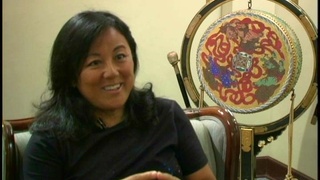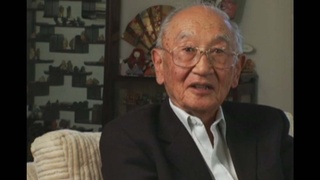Interviews
Near-death experience
That’s when I was wounded in my right hand and I didn’t get back to an aid station for three days and one day got off the bandages…why I think I started to go into shock. And ice cold feeling came in my toes and came up my body and I think reached just past my navel and started at my fingertips and came up past my shoulders and I thought at that moment I was going to die. I just knew that if it kept creeping I was…I was dead.
And I don’t think I was the only one cause Chaplin Youse was there praying and crying and asking me to fight and Doc. Komotani was there crying and also begging me, you know, to somehow pull out of it, but I think they all realized that I was going into shock and that I was just moments away from death. And then all of a sudden for some unknown reason- the creeping was very, very slow, but very, very steady- it suddenly stopped. And then started to recede, that’s the only time I felt that, that this is it.
Date: August 28, 1995
Location: California, US
Contributed by: Watase Media Arts Center, Japanese American National Museum
Explore More Videos

Wanting to take a stand
(1916-2010) draft resister, helped form the Heart Mountain Fair Play Committee

Ostracized by the camp newspapers
(1916-2010) draft resister, helped form the Heart Mountain Fair Play Committee

On trial for draft evasion
(1916-2010) draft resister, helped form the Heart Mountain Fair Play Committee

Draft resisters sent to jail
(1916-2010) draft resister, helped form the Heart Mountain Fair Play Committee

Fair Play Committee charged with conspiracy
(1916-2010) draft resister, helped form the Heart Mountain Fair Play Committee

Meeting other Americans in jail
(1916-2010) draft resister, helped form the Heart Mountain Fair Play Committee

Would do the same again
(1916-2010) draft resister, helped form the Heart Mountain Fair Play Committee

Arrested in camp for trying to leave
(1916-2010) draft resister, helped form the Heart Mountain Fair Play Committee

Unable to work when the war broke out
(1913-2013) Doctor specializing in obstetrics in Southern California

Traumatic experiences before camp
(1913-2013) Doctor specializing in obstetrics in Southern California

Joining the hospital unit in Santa Anita Race Track
(1913-2013) Doctor specializing in obstetrics in Southern California

Lost respect for the flag after incarceration
(1913-2013) Doctor specializing in obstetrics in Southern California

“Everybody went in like sheep”
(1913-2013) Doctor specializing in obstetrics in Southern California

Necessary apologies (Spanish)
(b. 1962) Peruvian Poet, Okinawan descendant

Finding out Roosevelt wanted Japan to attack
(1919-2020) Member of the 1800th Engineering Battalion. Promoted Japan-U.S. trade while working for Honda's export division.
